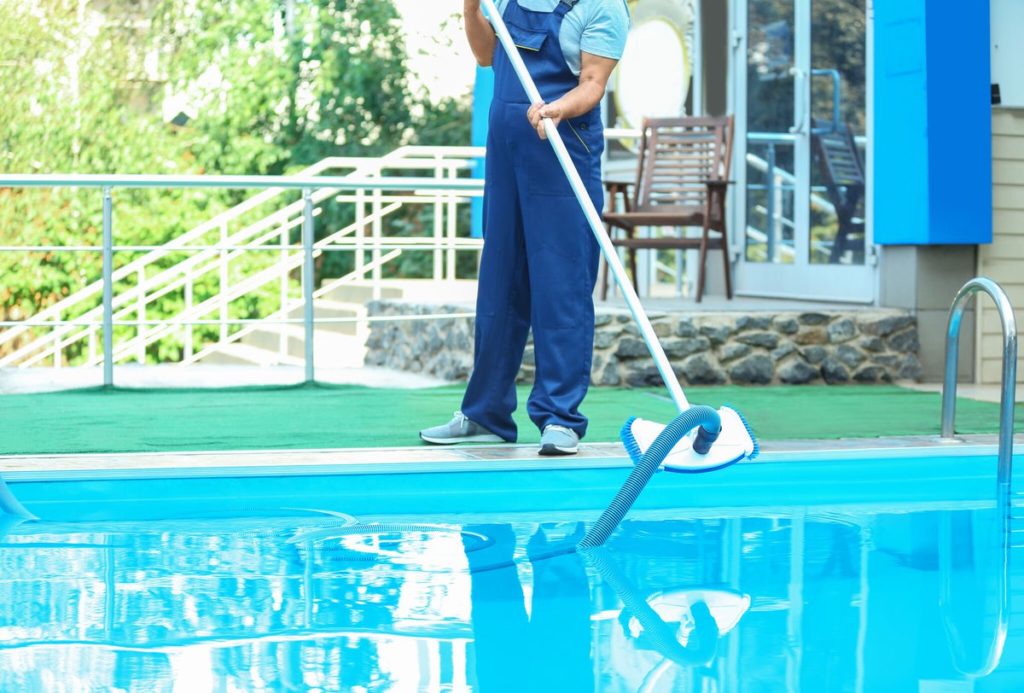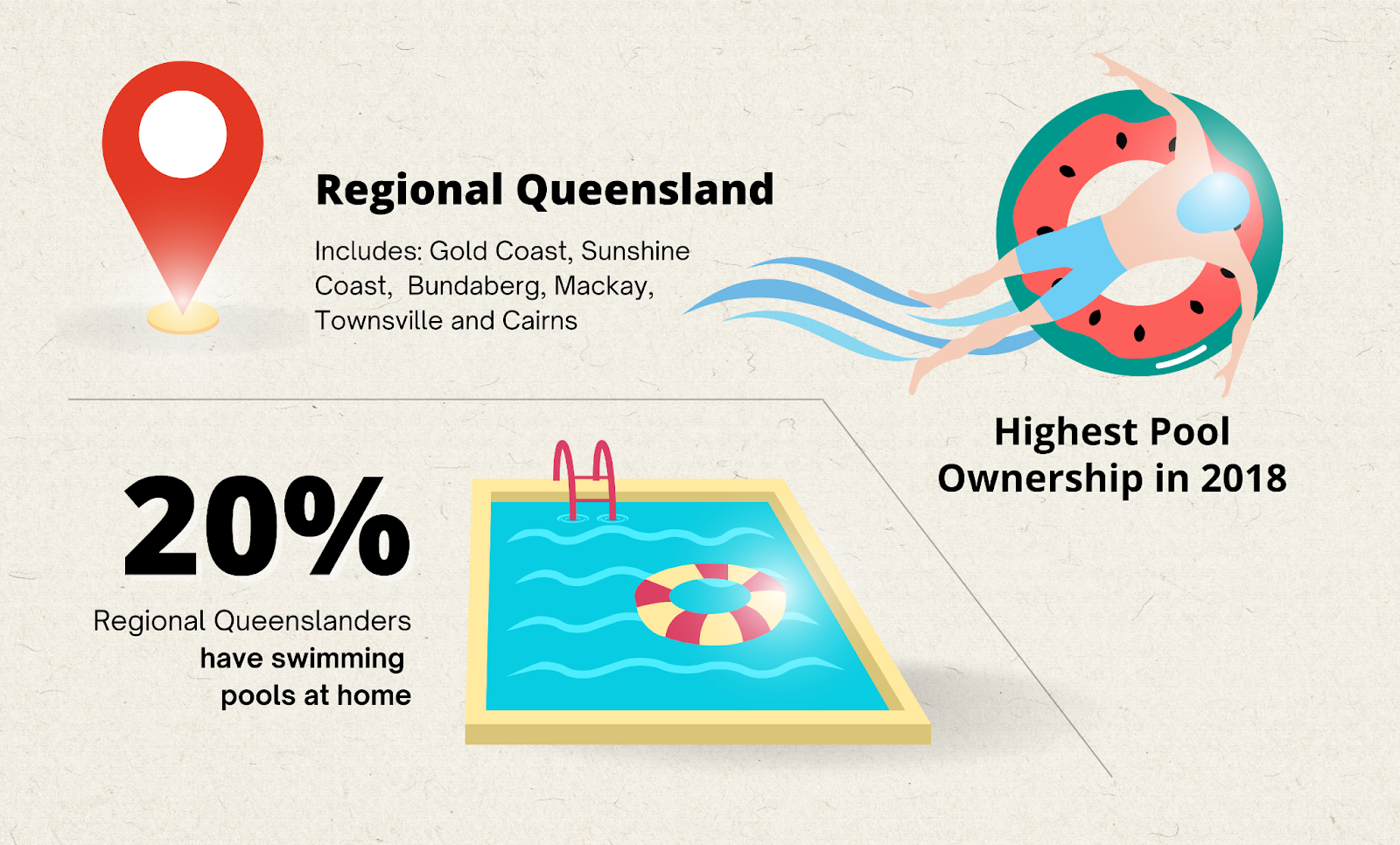
You’ve kitted your pool out with the trendiest features and it’s now the envy of your neighbourhood. The only thing missing is crystal-clear water that won’t irritate swimmers’ eyes or skin. But, achieving this is easier than you think – you just need the right mix of pool chemicals!
Your pool is subject to all sorts of contaminates, including bacteria, algae, and other microorganisms. The wrong pool chemicals can cause problems with your pool’s water quality, so it helps to select the right one.
But with so many pool chemicals available with their nifty packaging and descriptions, it’s tricky to know which one does what. Below is a quick overview of the different types of pool chemicals available and which is best for your pool.
The Best Pool Chemicals to Buy in 2022
Chlorine
Chlorine is a staple among pool chemical purchases because it is effective at killing bacteria and maintaining clean chlorine pool water. Maintaining correct pool chlorine levels is essential, as too high chlorine levels can damage your skin and eyes. It’s available in tablet, granular or liquid chlorine form.
Bromine
Bromine, much like chlorine, kills bacteria and keeps your pool water clean. Bromine is less harsh on your skin than chlorine, and does a similar job of maintaining balance in your pool. It’s also more stable in warm water, making it an ideal sanitizer for spas and hot tubs.
Looking for professional pool cleaners to do the job for you? Sidepost provides pool cleaning services all across Australia, including major cities like Brisbane, Melbourne, Perth, Sydney, Canberra, Adelaide, Gold Coast, Newcastle and Perth.
pH Balancers
pH balancers keep your pool’s pH level neutral. When ph levels become too high, it can scale your pool’s surface and equipment, ageing your liner faster than it should.
Lower levels, meanwhile, can cause corrosion in your pool’s ladders, pumps and other surfaces. Additionally, if your eyes and skin begin to feel irritated, it may be a sign that your pool’s pH levels are consistently too low. Always ensure your pH levels range between 7.2 to 7.8.
Algaecides
Algaecides are pool chemicals that are used to kill pool algae. Algae are aquatic plants that can quickly take over your pool if not kept in check, and they’re especially common in warmer climates.
This powder is typically used with chlorine to help keep a pool clean, clear and free of algae. However, there are different algaecides available, since not all algae is identical. Most algaecides are copper-based algaecides, which is a metal chemical compound.
Clarifiers
Clarifiers help to remove debris from your pool water by clumping particles together. This allows your filter or vacuum to more efficiently remove these particles from your pool. If your pool has a lot of leaves, smaller debris or even bugs, a clarifier is necessary to help keep the water clean.
Oxidizers
Oxidizers or otherwise known as pool shock, are powerhouse pool chemicals used to quickly and easily clean your swimming pool. Pool shock is a powerful cleansing agent that can kill bacteria, algae and other dirt and debris from your pool. This should only be used on properly maintained pools; if not, it could actually do more harm than good.
To use pool shock, simply follow the directions on the packaging. In most cases, you’ll need to add the recommended amount of pool shock to your pool’s filter system and then run the pump for a few hours. You may also need to brush the sides and bottom of your pool to loosen any dirt or debris that may be clinging to.
Enzymes
Pools typically accumulate a lot of body oil and other contaminants over time. Enzymes are naturally occuring proteins that help break down these contaminants, helping your filter to remove them. It works as a catalyst to speed up the process of breaking down oils and other grime and waste.
Water Testing Supplies
If you have a swimming pool, it’s crucial to test the water quality regularly. Poor water quality can not only lead to cloudy water, but it can also cause skin and eye irritation, as well as respiratory problems.
Let’s go through different pool water testing supplies to help you do this:
Liquid Test Kits
A pool liquid test kit is one of the most accurate and reliable methods to test pool water quality. This kit typically contains various pool chemicals which test for different aspects of water quality, including pH levels, chlorine levels, and alkalinity.
One of the biggest advantages of using a pool liquid test kit is that it can test for multiple water quality parameters simultaneously. This provides a complete picture of the quality of your pool water and ensures it is safe for swimming. Additionally, these kits are usually straightforward to use – you don’t have to be a chemist to decipher the results!
Test Strips
Pool test strips will change colour based on the levels of various chemicals in the water. By comparing the colours to a chart, you can accurately read the water quality.
Test strips are an easy and affordable way to test your pool water quality, and they help avoid problems like algae growth, bacteria buildup, and cloudy pool water.
However, there are a few things to keep in mind when using test strips:
Use a high-quality product – There are a lot of cheap test strips on the market that aren’t accurate.
Follow the instructions carefully – Depending on the type of test strip, you may need to dip the strip in the water for a certain amount of time or add water to the strip before reading the results.
Ensure to interpret the results carefully – Strip colours can be hard to read, so it’s important to compare the strip to the chart that comes with it. Even if the strip looks in the normal range, your pool might still have some problems that need to be addressed.
If you use test strips regularly, you’ll have a consistent baseline to compare future results. This will help you catch any changes in water quality quickly and act accordingly.
Calcium hardness increaser
If your pool has soft water, you may need to use a calcium hardness increaser. This helps to raise your water’s calcium levels, making it less likely to cause problems. You can find these products at most pool supply stores.
Be aware that soft water can lead to problems with your pool filter. If you have a sand or DE filter, it causes the media to break down and clog the pool filter. For a cartridge filter, you may need to change the cartridges more frequently than usual.
In areas with hard water, you may not need to use a calcium hardness increase. In fact, adding this chemical to your pool can actually make the water harder and more difficult to filter.
It is important to test your pool water regularly to ensure that the calcium and other minerals levels are where they should be. You can use a simple test kit or you can take a water sample to a pool supply store for testing.
Water Balancers
Water balancers help keep your pool crystal clear. They help to maintain your water’s pH levels, which affect chlorine levels, alkalinity, and other chemicals. Water balancers also help to control algae growth and keep your pool sparkling year-round.
Chemical feeder – This type of device dispenses and adds pool chemicals into the water regularly to maintain pH levels. Chemical feeders can be either manual or automatic.
Floating device – This device sits on your water’s surface and helps to keep the pH levels in check. Ensure your floating device is properly anchored so that it can’t move around in the pool and cause issues.
Pool cover – This helps to keep the water clean and clear by blocking out sunlight and keeping debris from entering. Pool covers come in various sizes and shapes, so it is important to find one that will fit your pool properly.
Water balancers are an important part of keeping your pool clean and clear. By choosing the right type of water balancer for your pool, you can help to ensure that the water remains clean and safe for everyone to enjoy.
Other Useful Pool Supplies
Other proper pool supplies can help keep your pool clean and running smoothly. These include:
Pool brush: Helps to scrub your pool’s walls and floor, effectively removing dirt and grime.
Pool vacuum: Sucks up debris from the bottom of your pool. This is far more efficient than using a pool brush.
Pool skimmer: Picks up floating debris from your pool’s surface.
Pool cover: Protects your pool from dirt, debris, and animals when it’s not in use. If your pool is under a large tree, for example, a pool cover can help to keep leaves from falling in.
Pool owners must have these pool supplies to ensure that their pool is always clean and running smoothly.
FInal Thoughts
While chlorine is the most popular pool chemical, there are other chemicals intended to keep your pool clean and running smoothly. These include pH balancers, calcium hardness increasers, water balancers, and algaecides. By using the right combination of these chemicals, you can maintain a clean and safe pool for everyone to enjoy.
Air Conditioning ( 3 )
Blinds installation ( 3 )
Building and Pest Inspections ( 4 )
Car Detailing & Car Wash ( 3 )
Carpet Cleaning ( 3 )
Carpet Installation ( 2 )
Custom Fish Tanks ( 2 )
Dry cleaning and ironing ( 3 )
Fencing Contractors ( 5 )
House Cleaning ( 7 )
House Painting ( 6 )
Ironing Service ( 1 )
Lawn Mowing ( 3 )
Pest control ( 2 )
Pool cleaning/servicing ( 3 )
Pressure Washing ( 2 )
Uncategorized ( 6 )
Professional Home Services at your Door
Get it all done with Sidepost - House cleaning, fencing, painting, and more.

